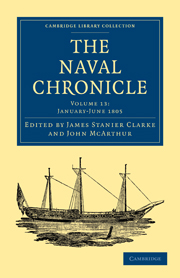 The Naval Chronicle
The Naval Chronicle Published online by Cambridge University Press: 10 January 2011
“So I left my poor plough to go ploughing the deep.”
Dibdin.We have been gratified in learning, that our biographical sketch of the “gallant Merchant Commodore Dance” has not been condemned as an innovation, but has rather been deemed a just tribute to that spirit of invincible valour, which so universally pervades both the Royal and Mercantile British Navy. The actions of another Merchant, whose birth indeed was humble, but whose high achievements were splendid, will more fully illustrate the truth of this remark; and prove unto the French, that if we are a Nation of Shopkeepers, the spirit of commerce has no tendency to abate the natural and inherent Valour of an Englishman.
The origin of Commodore Sir William James is enveloped in obscurity. Whether this may have proceeded from that feeling which revolts at the retrospect of poverty, it would now be difficult, if not impossible, to determine. That such feelings are frequently incidental both to families and individuals, is too true; since it too often has deprived us of the means of marking the progress of naval merit, from its first dawn, to its meridian splendour. Even Johnson was not invulnerable to its influence. That truly great philosopher, though endowed with sentiments too noble and elevated to permit any attempt at deceit, dwelt with pain on the poverty of his early years.
To save this book to your Kindle, first ensure [email protected] is added to your Approved Personal Document E-mail List under your Personal Document Settings on the Manage Your Content and Devices page of your Amazon account. Then enter the ‘name’ part of your Kindle email address below. Find out more about saving to your Kindle.
Note you can select to save to either the @free.kindle.com or @kindle.com variations. ‘@free.kindle.com’ emails are free but can only be saved to your device when it is connected to wi-fi. ‘@kindle.com’ emails can be delivered even when you are not connected to wi-fi, but note that service fees apply.
Find out more about the Kindle Personal Document Service.
To save content items to your account, please confirm that you agree to abide by our usage policies. If this is the first time you use this feature, you will be asked to authorise Cambridge Core to connect with your account. Find out more about saving content to Dropbox.
To save content items to your account, please confirm that you agree to abide by our usage policies. If this is the first time you use this feature, you will be asked to authorise Cambridge Core to connect with your account. Find out more about saving content to Google Drive.